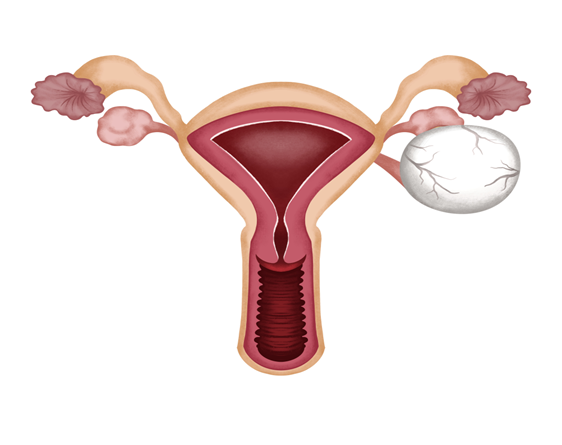Ovarian cysts are common fluid-filled growths that develop on or within the ovaries. While most cysts are harmless, asymptomatic, and resolved without treatment, some can lead to complications that require medical attention. Regular pelvic exams are crucial in detecting and managing any potential issues.
What Are the Types of Ovarian Cysts?
Most ovarian cysts are functional cysts, which form as part of the natural menstrual cycle. These typically resolve on their own within a few months. However, there are also non-functional cysts, such as cystadenomas, dermoid cysts, endometriomas, and ovarian cancerous tumors, which may need closer monitoring due to their potential to cause complications.
What Causes Ovarian Cysts and What Are the Symptoms?
Ovarian cysts are most commonly caused by ovulation, but other factors such as abnormal cell growth, endometriosis, and pelvic inflammatory disease lead to their formation.
The symptoms of ovarian cysts vary depending on their size and type. While smaller cysts often show no symptoms, larger cysts can cause:
- Pelvic pain
- Bloating
- Discomfort during intercourse
- Irregular menstrual cycles
How Are Ovarian Cysts Diagnosed?
Ovarian cysts are usually diagnosed through pelvic exams and imaging tests like ultrasounds or laparoscopy. These tests help to confirm the size, location, and nature of the cyst, which are essential factors in forming a treatment plan.
What is the Treatment for Ovarian Cysts?
The treatment option of ovarian cysts depends on factors such as the individual’s age, symptoms, and the type of cyst. Common options include:
- Watchful waiting for functional cysts that are likely to resolve on their own
- Surgical removal for larger or symptomatic cysts
- Hormonal medications to regulate ovulation and reduce the risk of future cyst formation
Can Ovarian Cysts Be Prevented?
While ovarian cysts cannot always be prevented, hormonal contraceptives may help reduce their recurrence by regulating ovulation. Regular pelvic exams and prompt reporting of symptoms are vital for early detection and management.
How Can You Live with Ovarian Cysts?
If diagnosed with ovarian cysts, it is essential to monitor any changes in symptoms and follow the doctor’s advice on treatment and follow-up appointments. For individuals with endometriotic cysts or those requiring surgery, fertility may be affected, and freezing eggs before surgery could be considered to preserve fertility options.
Open communication with doctors is essential for timely interventions and overall well-being.

